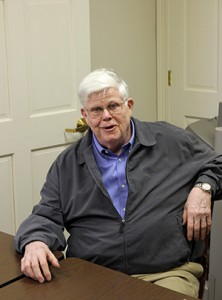Richard Paige — His name weaves through our history all the way back to the moment where the original trustees knelt in the snow and founded this institution. The tradition we hold most dear – the bell that rings students in on Freshman Saturday and out on Commencement – had its beginnings with him. He, of course, is Caleb Mills.
For many, Mills simply is the name we attach to the spirit that flows through this place. How are we to know our first professor, a man who last taught in 1876 and passed away in 1879? Who can bring that spirit to life?
Chuck Beemer can. A lawyer, noted Civil War scholar, and the author of two books, Beemer is also Caleb Mills’ great-great grandson.
Beemer was born in Montgomery County and graduated from Crawfordsville High School in 1958. He earned his undergraduate degree from Colorado College, has a master’s from Wisconsin, and a law degree from North Carolina.

While on campus recently to discuss his latest book, “My Greatest Quarrel with Fortune: Major General Lew Wallace in the West, 1861–1862”, I sat down with him to talk about his legacy, his great-great grandfather, and coming home.
Are you more aware of your great-great grandfather when you come back to campus?
To be honest, I feel a sense of that while I’m on campus, but I feel a sense of it quite often. Mom (Julia Beemer) felt a very close kinship to Caleb Mills. She obviously didn’t know him, but I’ve heard the name Caleb Mills since I was yeah-high to a Fig Newton. I remember real early on that I was asked to make a presentation to the local grade school PTA meeting. Dad insisted that I say something about being the great-great grandson of Caleb Mills. It really bothered me to do it. Frankly, it sounded like I was bragging or trying to achieve a special status. The audience responded to it almost like it was an everyday commonplace thing. I think the name Caleb Mills is a very well-known name in Crawfordsville.
How much do you know of Dr. Mills and his accomplishments?
I’m very proud of the fact that he was the first professor here. Dad always used to talk about how they came across the mountains and knelt in the snow. So that image has been with me for a long, long time. I’m proud of the fact that he was superintendent of education, and I read someplace that he did so much to advance the cause of free public education that he became known as the Father of the Free Public School System in Indiana. That’s always meant quite a bit to me.
How much did his influence have on you becoming a Civil War historian or lawyer?
I’m not sure of any per se, more like an atmosphere. It was absolutely expected that my older brother and I would go to college. I desperately wanted to come to Wabash, but dad felt that getting away from home was an integral part of the educational process. He really kiboshed the idea; certainly nothing to do with Wabash, he recognized it as a great school. I’ve always been a fun loving guy and simultaneously somebody who has a strong sense of the need for education both in your personal and professional life. I think it was kind of an unspoken, unidentifiable, pervasive type of influence.
What do you know of him as a person?
I have read a lot of his (Caleb’s) letters to his son when Benjamin Marshall was in command of a company of black U.S. troops during the Occupation of Vicksburg in 1864. (He was a) Terribly, terribly, terribly strict disciplinarian, even with his son…very formal. There is no evidence of pleasantries. Very straight forward. Benjamin Marshall is quite like him in return letters, but you can see a little emotionalism creep in. As much as I revere and respect Caleb Mills, I don’t think I would have liked for him to have been my father. (laughs loudly) It would not have been easy.
Did those letters help to humanize him for you?
Absolutely. I have a great deal of respect and admiration for him as a man, even more so for what he accomplished. I would love to go back in time and sit and talk to him for however long. I don’t know how he’d relate to the PGA Tour or NBA basketball, but he must have been a man of immense character and I could tell he was a man of immense persuasion.
Does the campus still feel like home for you?
Still does. It never changes. Crawfordsville doesn’t change much either. It had been 40 years since I’d left, and I was struck by how much had not changed. The people of Crawfordsville have always been very warm and friendly. My relationship with the college has always been quite, quite solid. I follow the football and basketball teams closely. I did not go to Wabash, but I can assure you that Wabash is and will always be a strong part of me. I’m extremely pleased whenever I read something about Wabash because it’s always good news.
How meaningful is it to you that Caleb Mills, and his bell and mace, are still central to who we are?
When we got the Wabash Magazine a month or so ago, one of the first pictures at commencement had the faculty marshal carrying the cane. I showed it to (his wife) Nancy and said, “Your great-great grandfather-in-law is in that picture.” All she sees are guys in caps and gowns. She asked, “What are you talking about?” I said, “He’s right there in front. There is his cane. The spirit of Caleb Mills is in that picture.” Things like that mean a lot to me.